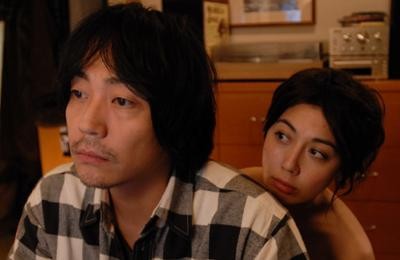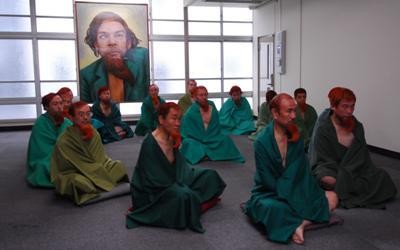| Reviews & Columns |
|
Reviews DVD TV on DVD Blu-ray 4K UHD International DVDs In Theaters Reviews by Studio Video Games Features Collector Series DVDs Easter Egg Database Interviews DVD Talk Radio Feature Articles Columns Anime Talk DVD Savant Horror DVDs The M.O.D. Squad Art House HD Talk Silent DVD
|
DVD Talk Forum |
|
|
| Resources |
|
DVD Price Search Customer Service #'s RCE Info Links |
|
Columns
|
|
|
Tokyo!
I can still remember how hyped up I was for Lionsgate's 2005 release Three...Extremes, which snagged Fruit Chan, Takashi Miike, and personal favorite Park Chan-Wook for a trilogy of horror stories. Unfortunately, it was a massive letdown; not even Chan-Wook's "Cut" segment could raise my flagging interest. So when I heard about Tokyo! luring Leos Carax, Bong Joon-Ho and my all-time favorite director Michel Gondry for three stories about Japan's bustling capital city,  I kept my expectations in check. Luckily, although the city itself doesn't really inform any of the three directors, there's some cinematic magic in each one of the movie's segments.
I kept my expectations in check. Luckily, although the city itself doesn't really inform any of the three directors, there's some cinematic magic in each one of the movie's segments.
The stories break down as follows. "Interior Design" concerns Akira (Ryo Kase) and Hiroko (Ayako Fujitani), a couple moving to Tokyo for the first time. Staying at the tiny apartment of their friend Akemi (Ayumi Ito), the days stretch into weeks as a sense of uncertainty grips Hiroko about her place in life. "Merde" tracks the rampage of a mysterious creature who inhabits the city's sewers and occasionally pops up to wreak havoc, much to the excitement of the local news. When the creature is caught, a like-minded lawyer (Jean-François Balmer) appears to defend him and his violent and disturbing actions. Lastly, "Shaking Tokyo" tells the story of a hikikomori (Teryuki Kagawa), or shut-in, who's been hiding away inside his apartment for ten years. When an earthquake and a beautiful pizza girl (Yû Aoi) collide on his doorstep, his sense of isolation is interrupted, and he begins to wonder what he's been missing in the outside world.
What I like about Gondry is his surreal, yet oddly sensical ideas, each with a tiny tinge of neurotic worry. In his opening segment, aspiring director Akira wonders aloud about flat ghosts living in the tiny gaps between all the buildings in the city, and you can hear Gondry's voice in it. "I could use tissue paper for them," he muses. Akira's directing doesn't seem to be very good, but he's certainly ambitious. He brings a smoke machine to the premiere of his black-and-white time travel film at a local porno theater, and pumps real smoke into the auditorium whenever smoke is shown on screen, which is to say every shot. He's a bit of a clueless drifter, but his girlfriend Hiroko (Ayako Fujitani) is the opposite. She feels the burden she's placing on her friend Akemi as their search for a home drags on. "You have no ambition," Akira tells her when telling Akemi how she turned down a role in his movie, and it eats away at her. The segment builds too slowly as Gondry puts the audience in Hiroko's stressed-out shoes, but the payoff is wonderful, like the second half of Chungking Express if it came from another universe.
 The surprise for myself was Bong Joon-Ho's "Shaking Tokyo"; it's final short but the best of the bunch. Teryuki Kagawa's apartment is tiny but dazzling. Perfectly-aligned towers of pizza boxes loom over his living room, a pyramid of toilet paper rolls climb the wall of his bathroom, and each and every nook and cranny is precisely stocked with a beer can or a Cup of Noodles. After the earthquake, everything is crooked, right down to The Man's emotional core. The pizza delivery girl lies unconscious in his doorway. He blows on her sleeve, thinking he sees the edge of a tattoo, but underneath there are strange buttons on her skin. He reaches out and touches one that looks like a computer power button, and makes an unexpected connection he's been missing for so long. The romantic sentiment in this segment rings a little hollow, but the human connection is still palpable and the rest is funny, surprising, dazzling and exhilarating. I've been putting off watching Joon-Ho's critically acclaimed monster film The Host for awhile now, but I won't be able to anymore.
The surprise for myself was Bong Joon-Ho's "Shaking Tokyo"; it's final short but the best of the bunch. Teryuki Kagawa's apartment is tiny but dazzling. Perfectly-aligned towers of pizza boxes loom over his living room, a pyramid of toilet paper rolls climb the wall of his bathroom, and each and every nook and cranny is precisely stocked with a beer can or a Cup of Noodles. After the earthquake, everything is crooked, right down to The Man's emotional core. The pizza delivery girl lies unconscious in his doorway. He blows on her sleeve, thinking he sees the edge of a tattoo, but underneath there are strange buttons on her skin. He reaches out and touches one that looks like a computer power button, and makes an unexpected connection he's been missing for so long. The romantic sentiment in this segment rings a little hollow, but the human connection is still palpable and the rest is funny, surprising, dazzling and exhilarating. I've been putting off watching Joon-Ho's critically acclaimed monster film The Host for awhile now, but I won't be able to anymore.
Only the second chapter, Leos Carax's short "Merde" was a disappointment to me. Watching "The Creature From the Sewers" (Denis Lavant) climb up and start wreaking havoc in an almost unbroken long shot walking down a Tokyo street is dementedly funny. He's a one-man Godzilla, grabbing crutches from disabled passerby, wolfing down flowers and later tossing decades-old grenades around haphazardly, and Carax uses his exploits to take a few uncofused shots at the nature of war and the exploitative media. Balmer's lawyer character, however, brings the piece to a grinding, boring halt with a string of endless sequences where Balmer, acting as translator, yells gibberish back and forth between Lavant and a host of irritated, bloodthirsty cops. It's definitely not terrible, but it's the slowest part of the movie.
Each of the directors has an eye for what they want to do with the city of Tokyo. Gondry's vision is pretty straightforward; he showcases some quirky buildings but makes it seem like a regular metropolis (all the more intimidating for the young couple who isn't ready to grow up). Carax's look is more rough, with choppy digital video, cold grays and dark sewers, and clinically clean interiors and dark-suited businessmen.  In the final segment, you see more of The Man's mathematically perfect apartment than you do of anything at first, but outside the front door lays a blindingly bright overload of information, a maze of signs and numbers on every conceivable surface. I'd guess this range of vision is what appealed to the directors, but while Tokyo is a melting pot like few other places in the world, there's little reason the movie couldn't have happened somewhere else (Gondry even draws from a graphic novel titled Cecil and Jordan in New York).
In the final segment, you see more of The Man's mathematically perfect apartment than you do of anything at first, but outside the front door lays a blindingly bright overload of information, a maze of signs and numbers on every conceivable surface. I'd guess this range of vision is what appealed to the directors, but while Tokyo is a melting pot like few other places in the world, there's little reason the movie couldn't have happened somewhere else (Gondry even draws from a graphic novel titled Cecil and Jordan in New York).
The problem with most short films is that they try to tell a story, but the confines of a 32-minute block in a feature-length film doesn't leave enough room for a three-act-structure. The three filmmakers of Tokyo! opt instead to focus on the emotional and visual impact of their pieces, and that willingness to do something more loose and experimental makes all the difference. There are amazing things in this movie, even in the unsuccessful parts, and fans of any one or all three of these directors should leave feeling that it was worth the trip.
The DVD
Tokyo! comes in a standard keep case with the "neon sign" poster artwork on the front (which might make it look like some sort of weird documentary -- nice idea, but the execution is kind of boring) and an equally nice but uninteresting back cover (the slant to the text and images is about as stylish as it gets). The menu, however, takes the front cover and gives it a weird, demented stretch and animates the lights, which makes it considerably more interesting, but may give you a bit of a headache if you stare at it for too long. There is no insert and the disc has the same logo.
The Video
Like The International, I saw Tokyo! presented in digital, but the difference in quality from the DLP presentation and the 1.85:1 anamorphic widescreen image on this DVD isn't as extreme. Detail is pretty good, and I didn't see any compression artifacts, but black levels are a tad brighter than I'd like them to be, mainly during "Shaking Tokyo". On the other hand, extremely small text on-screen during the same segment is crisply defined (I've been seeing lots of movies recently where larger fonts during the credits is slightly unreadable). Overall, the picture isn't striking, but it's solid.
The Audio
The Dolby Digital 5.1 audio is the same story. Tokyo! is performed mainly in Japanese with some French, and it comes through clearly and cleanly, which I suppose is the most important thing. My main disappointment was in the surrounds, which are generally active but don't really pack the directional punch I was hoping for (such as the scene where Merde is flinging grenades). 2.0 audio is also included, but if you're insistent upon terrible dubs, you're out of luck. English subtitles are provided, in orange for some reason.
The Extras
Each one of the three stories gets a lengthy making-of featurette. "The Making of Interior Design" (29:58) is first, focusing mainly on Gondry's way of interacting with the actors as a director. It's a nice change of pace, because most interviews with him focus on his visual style (which Gondry directly addresses by suggesting the audience should figure out some of his tricks on their own). Next, "The Making of Merde" (29:29) takes a more step-by-step look at Carax's piece, examining almost every small decision in the stunt/performance process. Lastly, "The Making of Shaking Tokyo" (33:20) is a fly-on-the-wall view of Bong Joon-Ho's final chapter. They're certainly meaty, and there's some good information in these pieces (I liked watching Kagawa work), but on the whole they're all a bit dry, which is a disappointment given the amount of material presented.
After that, we have a more standardized featurette, titled Director Interviews (23:50), which fares a little better at providing interesting tidbits from the filmmakers. Gondry is nterviewed with Gabrielle Bell, the co-writer of the screenplay and creator of the comic book he based his film on, and he makes several amusing comments, while Carax muses about not making a film in almost a decade and reuniting with Lavant, and Bong Joon-Ho talks about how he wanted to be a cartoonist growing up and his process of envisioning movies. If you're only going to watch one of the featurettes included on this disc, this one provides the best overview of the production. A photo gallery (2:54) and the movie's energetic and catchy original theatrical trailer (1:43) conclude the bonuses.
All four segments are presented in anamorphic widescreen and are subtitled in more orange English text (which are automatically switched on). The DVD opens with trailers for "Frost/Nixon: The Original Watergate Interviews", Eden and Just Buried.
Sadly, Gondry's short about his lead actress Fujitani, "How to Blow Up a Helicopter (Ayako's Story)" from his second volume of music videos and shorts isn't included, but I'm sure either disc space prevented it from making the cut or Gondry made it specifically for his own DVD.
Conclusion
Three out of four substantial bonus features don't add much to the package, but the movie's still one of the few successful anthologies I've seen, packed with wonder and creativity from beginning to end even during a few dry spots. Pick it up on Blu-Ray if you can, but for standard-definition viewers this package comes highly recommended.
Please check out my other DVDTalk DVD, Blu-ray and theatrical reviews and/or follow me on Twitter.
|
| Popular Reviews |
| Sponsored Links |
|
|
| Sponsored Links |
|
|
| Release List | Reviews | Shop | Newsletter | Forum | DVD Giveaways | Blu-Ray | Advertise |
|
Copyright 2024 DVDTalk.com All Rights Reserved. Legal Info, Privacy Policy, Terms of Use,
Manage Preferences,
Your Privacy Choices | |||||||













